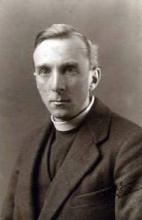Theologian and social commentator Vigo Auguste Demant was born 8 November 1893 into a family with French and Danish roots. After attending school at Newcastle and in France he earned a degree in engineering at Armstrong College (later King’s College). In 1916 Demant went to Oxford to study anthropology but changed direction. He attended Ely Theological College being ordained as a deacon of the Church of England in 1919 and as a priest in 1920.
Demant served curacies in Oxford and London then became a vicar in Surrey. In 1941 he was named a canon of St Paul’s and in 1949 he became Canon of Christ Church and Regius Professor of Moral and Pastoral Theology at Oxford University a position he would hold until retirement in 1971.
Considered a founder of Christian sociology in England Demant was a member of T. S. Eliot’s Christendom Group which published a Anglo-Catholic sociology journal. The group also organized the annual Anglo-Catholic Summer Schools in Sociology from 1925 to 1955. In 1950 Demant gave a series of eight lectures titled ‘Religion and the Decline of Capitalism’ on the BBC’s Third Programme. His Gifford Lectures at St Andrew’s in 1957-1958 concerned what he called ‘the natural history of Christianity.’
Demant’s writings include The Just Price (1930); This Unemployment: Disaster or Opportunity? (1932); God, Man and Society (1933); Christian Polity (1936); The Religious Prospect (1939); Theology of Society (1947); Our Culture: Its Christian Roots and Present Crisis (1947); The Responsibility and Scope of Pastoral Theology To-Day (1950); Religion and the Decline of Capitalism (1952); The Elements of Christianity (1955); A Two-Way Religion (1957); Christian Sex Ethics (1963) The Idea of a Natural Order (1966); and Why the Christian Priesthood Is Male (1972).
Demant married Marjorie Tickner in 1925 and they had three children. He retired in 1971 to Headington Oxford and died 3 March 1983.



